Five Ways You Can Donate to Charities in Croatia in Time for Christmas
December 14, 2022 - Christmas time often inspires generosity. In Croatia, like in many other places, it is the right time for dinners, receptions, parties, and events organised for charity. There are plenty of those happening all around the country, but there are also many other ways to practice helping those in need. For this holiday season, we are presenting some of the charities in Croatia which accept donations and help. You can, of course, donate and help any other time as well.
The Croatian Red Cross
The international Red Cross movement is one of the best-known humanitarian organisations in the world. With a branch in every Croatian county, they are easily accessible and help by acting in every aspect of life where help might be needed. From providing first aid education and blood donations to crisis preparedness and ecological protection, the list of everything they do is quite long and all-encompassing. The ways in which everyone can help include donating blood, household items, and money, volunteering, or becoming a member. You can do that from the position of an individual, a company, or an organisation. The donations part of their website has all the useful information in English, including their account info and a list of needed aid items.
SOS Children's Village (Dječje Selo) Hrvatska
The SOS Children's Village Croatia Association has been operating since February 25, 1992, as an equal member of SOS-Kinderdorf International, the world's largest non-governmental organisation that operates in 135 countries around the world. The executive part of the SOS Children's Village Croatia Association consists of the National Office, which coordinates all SOS programs in the country. Besides volunteers and hands-on help, the organisation accepts one-time, as well as regular donations, of products and services or money, by individuals or companies. One-time donations can be made using the information provided here, and you can use cryptocurrency to do so as well.
The Perfect Circle (Savršen Krug) Humanitarian NGO
The humanitarian organisation Perfect Circle (Savršen Krug) regularly provides children in student homes, families with many children, and families with elderly and vulnerable people with clothes, food, and hygiene items. They are organising a Christmas action to help children, young people, and socially disadvantaged families, which lasts until December 23.
This year, the plan is to brighten the holidays for 230 families with children and 30 children and young people without adequate parental care.
Last year, in this way, they helped 140 families with children and 50 children and young people. They distributed over 150 packages but, unfortunately, did not collect enough monetary donations. They are optimistic this year and hope to collect almost twice as many packages!
Collection of monetary donations, as well as donations of food items, is underway. This December, the plan is to distribute around 300 Christmas packages in seven counties.
If you would like to donate food and hygiene items, you can follow the list provided on the website and by calling Aleksandra at +385 91 3773 771. If you would like to make a monetary donation, you can use the account information below:
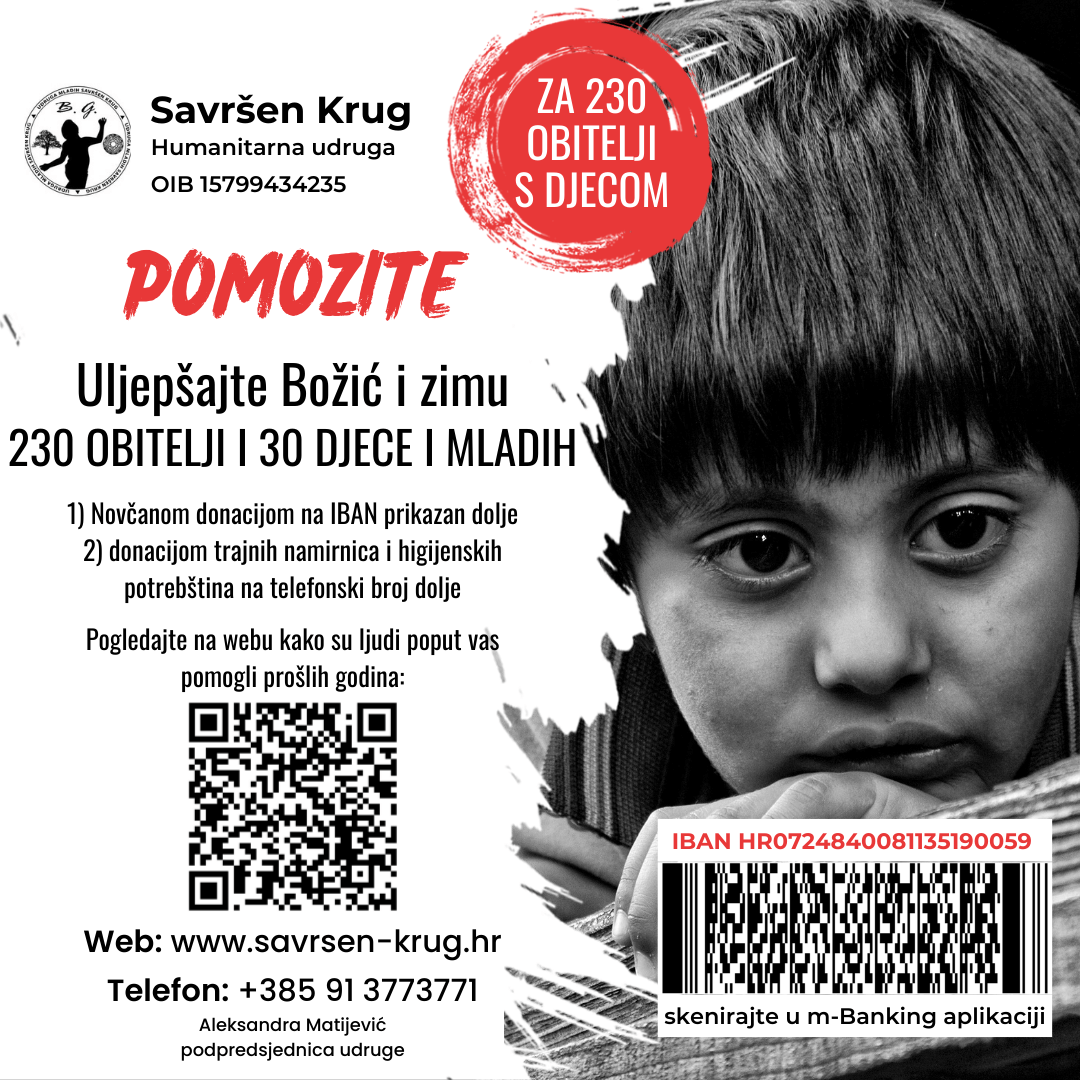
BEA Centre for Eating Disorders
With a donation to Rijeka's Bea Centre, you can help provide psychological help to people suffering from anorexia, bulimia, and non-specific eating disorders. Children and young people suffering from anorexia and bulimia usually hide their pain; they think that no one understands them and that the world does not care about their suffering. The BEA Centre is there for them, offering free advice and conversations with experts.
Your donation will provide a free consultation for a child or young person suffering from an eating disorder who will receive support, understanding, and expert advice on further treatment. You can donate directly to their bank account using the information provided below:
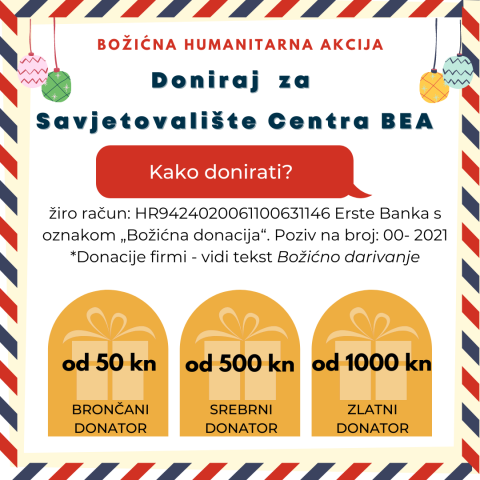
Pula: Christmas stand of the Homeless Shelter
As part of Pula's December in the City, a stand with Christmas wreaths and decorations whose profits will be directed toward the users of the Homeless Shelter has been set up at the market. The products were made in workshops throughout the year.
As Glas Istre wrote, the donations were one year used to buy a television, another for a clothes dryer, and there was something left over for pocket money for the volunteer Vesna Biritteri, who has been volunteering at the stand and the Shelter for 12 years. Now retired, she used to work at the homeless shelter as well.
She says that the turnout of Pula's residents is always very good, and so is this year. At the start of December, you might have visited the stand at the market, from where it moved to a small stall at Giardini with a more generous offer, including handicrafts, knitted scarves, hats, and leg warmers.
For more, make sure to check out our dedicated Lifestyle section.
Good Guy Dejan Gemeri Gifts €100 Monthly to Student from Vukovar
August 8, 2022 - Dejan Gemeri is a physics doctoral student from Vukovar, who studies at the university in Wuppertal. He announced a competition for a student scholarship that he will pay out of his funds, which he aptly named Gemerica. This way, Gemeri continues to help the community where he grew up.
Press 032 reminds us that Gemeri previously awarded HRK 3,000 to the student of generation of the Nikola Tesla Technical School from Vukovar.
"I am hereby announcing a competition for a scholarship from my funds, which I aptly named "Gemerica". All students residing in Vukovar can apply (surrounding villages are also considered because everything is too close and connected to make a difference). The amount of the scholarship is €100 for 10 months. Certain institutions, when announcing tenders, require that you study within the borders of the Republic of Croatia. Unlike them, the concept and goals of education are completely clear to me, so that does not matter. If you study in Vukovar, Osijek, Zagreb, Novi Sad, Belgrade, Tuzla, Turin, or Malta, it doesn't matter, you can apply.
All you have to do is send a motivational letter to This email address is being protected from spambots. You need JavaScript enabled to view it..
Why did you choose that particular study? What motivates you? What are your work experiences? What are your life plans and goals? Etc. This is just an example of some guidelines, but you should write what you think is important. No rules. The grade point average doesn't mean much to me because it's no proof that you know or don't know something or that you're good at something or not. Mine was also a horror because I was only interested in certain things, while I procrastinated on others because I had to (it's like that at every university).
Preference is given to full-time students. Graduate students (4th and 5th year) also take preference because they should already be able to clearly articulate their immediate future.
The competition lasts until August 21, after which 2 other people will review the letters together with me so that we can observe everything from different perspectives. After that, I will narrow it down and arrange a short Zoom (video) call to make sure that you are a live person and maybe ask one or two questions if there is anything unclear. After that will come the final selection, where we will formalise things and the first payment will happen in October. Quite simply.
Likewise, I assume that there will be several good candidates, so accordingly I am open to donating another scholarship, of the same amount", Gemeri wrote in his Facebook post.
He added that this is an invitation to others who have left their villages and cities in recent years to help the community in which they were born. According to him, there are still many young people in Croatia who need help to get an education, stand on their own feet, and become their own people.
"Investing in knowledge is the best possible investment, and it is up to our society to enable young people to get an education and make progress. Many need help, and fortunately, many can help in this or a similar way. My example is an invitation to others to get involved in some way. Let them use my model or come up with something new. It is important to help young people in need", concluded Gemeri.
For more, make sure to check out our Lifestyle section.
Friends of Croatia: UNICEF - Croatia an Example to the World When it Comes to Breastfeeding
May 27, 2021 - The sixth article in the "Friends of Croatia: UNICEF" series explores the work of the UNICEF Office for Croatia. What is done regarding children's rights in Croatia, positives, and negatives, and how can you help if you want to?
To ensure that our world even stays the same, let alone improves, new generations are essential. But, before they grow old enough to participate in society, society must first take care of the youngest ones to grow and develop. Society must ensure for kids that they grow up in families filled with love, make sure that kids can go to school, that they are healthy, safe from violence, that they are not hungry or thirsty, and give them overall opportunity to make it in the world.
Basically, children have rights, and they are in more detail elaborated in 54 articles. For more details, have a look at the Convention on the Rights of the Child that came to power on September 2, 1990, by the United Nations (UN) General Assembly.
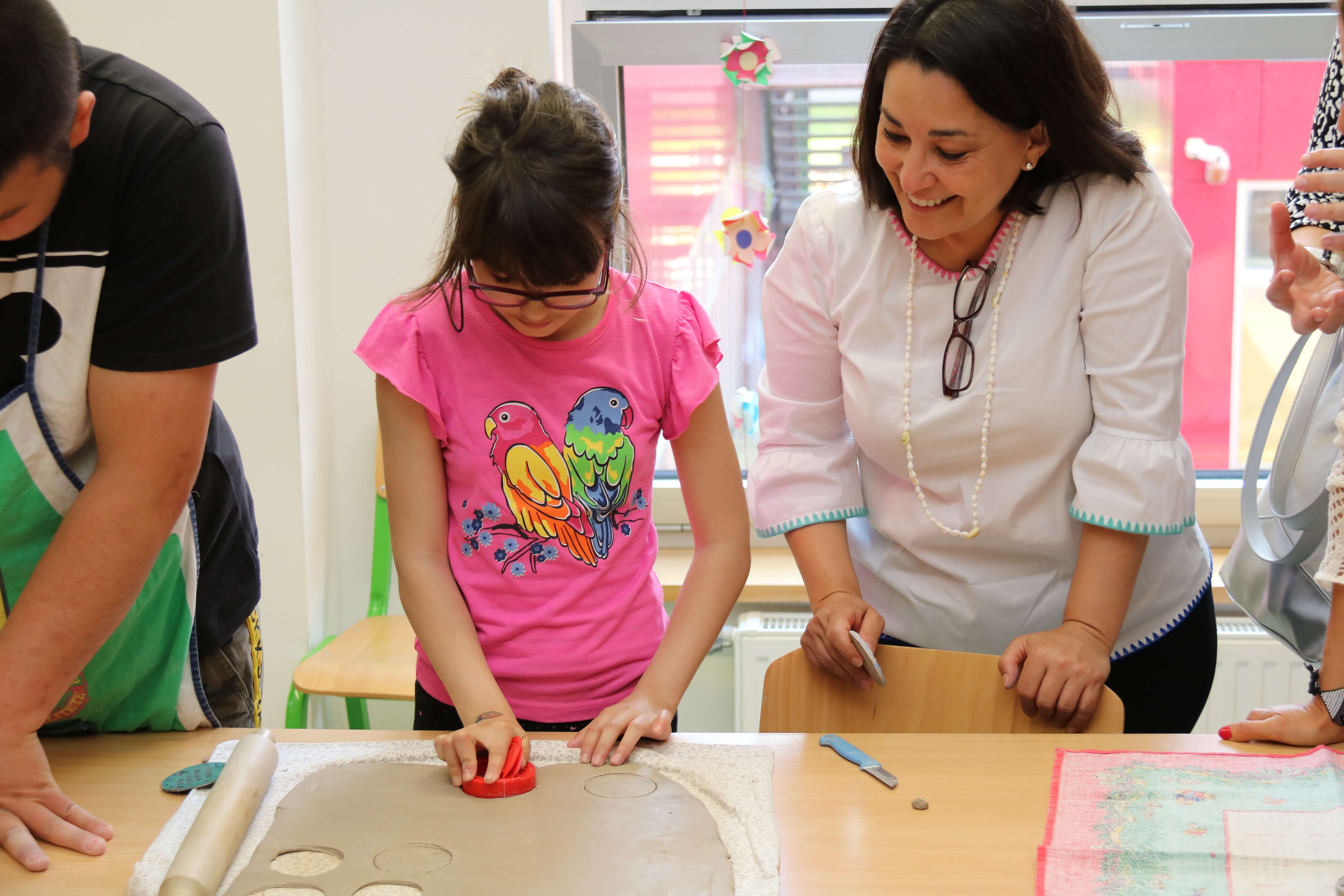
Regina M. Castillo, UNICEF office for Croatia representative with children with disabilities in Centre Tomislav Špoljar in Varaždin © Marin Ilej/UNICEF
The UN is dedicated to seeing this Convention is being respected, and United Nations International Children's Emergency Fund, commonly known as UNICEF, specializes in the issues of children's rights. Established in the aftermath of World War II, UNICEF has been at the frontlines of humanitarian crises, armed conflict, and natural disasters.
„Undeterred by the scale of the crises, we rise to the challenge, reimagine what is possible and respond by helping millions of children survive and thrive. Our on-the-ground expertise has reached more than 191 countries and territories, through committed partnerships and a passion for innovation“, says UNICEF on its official website.
Croatia signed and agreed with the Convention, and UNICEF today has its own office in Zagreb. Furthermore, it's worth noting that UNICEF has existed for 75 years, and despite firstly coming to Croatian territory while the country was part of the former Socialist Federal Republic of Yugoslavia, UNICEF has been with Croatia since the organization was established.
„Many people do not know that UNICEF helped to eradicate malaria in Croatia and that UNICEF played a key role in the development of modern dairy. Dairies were built in Zagreb, Rijeka, and Split, and factories for the production of powder milk in Osijek and Županja. Milk was distributed in schools, and for many children, it was their only meal during the day“, says Regina M. Castillo, UNICEF Office for Croatia representative.
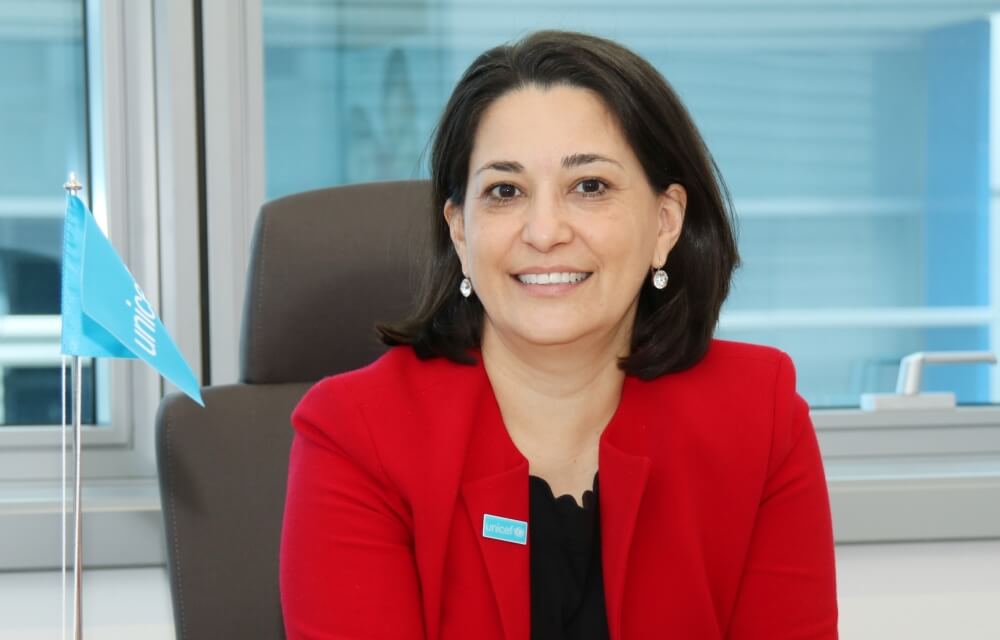
Regina M. Castillo, UNICEF office for Croatia representative © Marin Ilej/UNICEF
The UNICEF representative is elected for a five-year mandate, and Regina M. Castillo came to her function in Croatia in 2019. Her career in the UN started in 2001 and was in charge of economic and social questions in the Executive Office of the UN chief secretary Kofi Annan in New York. This was followed by Castilla moving to work in the mutual program for HIV/AIDS, known as UNAIDS. She was first the director of private sector partnerships in Geneva (2006-2012) and then moved to be the director for Bolivia, Ecuador, and Peru (2012-2015). She majored in International relations and public politics.
Born in Nicaragua, she first started her career in the 1990s as a diplomat, and she was also the headmistress for international trade in the Nicaraguan Trading Ministry.
Helping Croatia before it was cool (or an independent country)
Castillo went on to continue that after World War 2, UNICEF fed six million children every day, which included many children in Croatia.
„One of those children was our dear colleague, prof. Josip Grgurić, who is still working tirelessly for the youngest. He still remembers the yellow cheese that was part of UNICEF's humanitarian package for families, as well as the chocolate that he then tasted for the first time. He later worked at the children's hospital in Klaićeva, which UNICEF helped found, and he still works hard on UNICEF’s Child-Friendly Hospital Initiative“, says Castillo indicating how valuable but also inspiring UNICEF can be to children. Castillo added that in the Homeland War, UNICEF was the first organization on the ground, making sure that children and families received the necessary psychosocial support and humanitarian packages. After the war, they educated children on how to protect themselves from landmines.
Today Croatia developed, joined NATO and EU, and is a modern European country. With such progress, there have been many improvements in respect to children and their rights.
„Croatia has a low mortality rate of children under the age of five, extremely low stunted growth rate due to inadequate nutrition in the first years of life and the enrolment rate of children in primary school is almost 100 per cent“, pointed out Castillo.
„Croatia is an example in the world when it comes to the promotion of breastfeeding. It is rare that all public maternity wards in a country have the status of 'Child-Friendly Hospital'. With the support of UNICEF, partners have organized a network of breastfeeding support groups, and now we have more than 200 support groups in Croatia“, added Castillo on what the world can look up to this small South-Eastern European country.
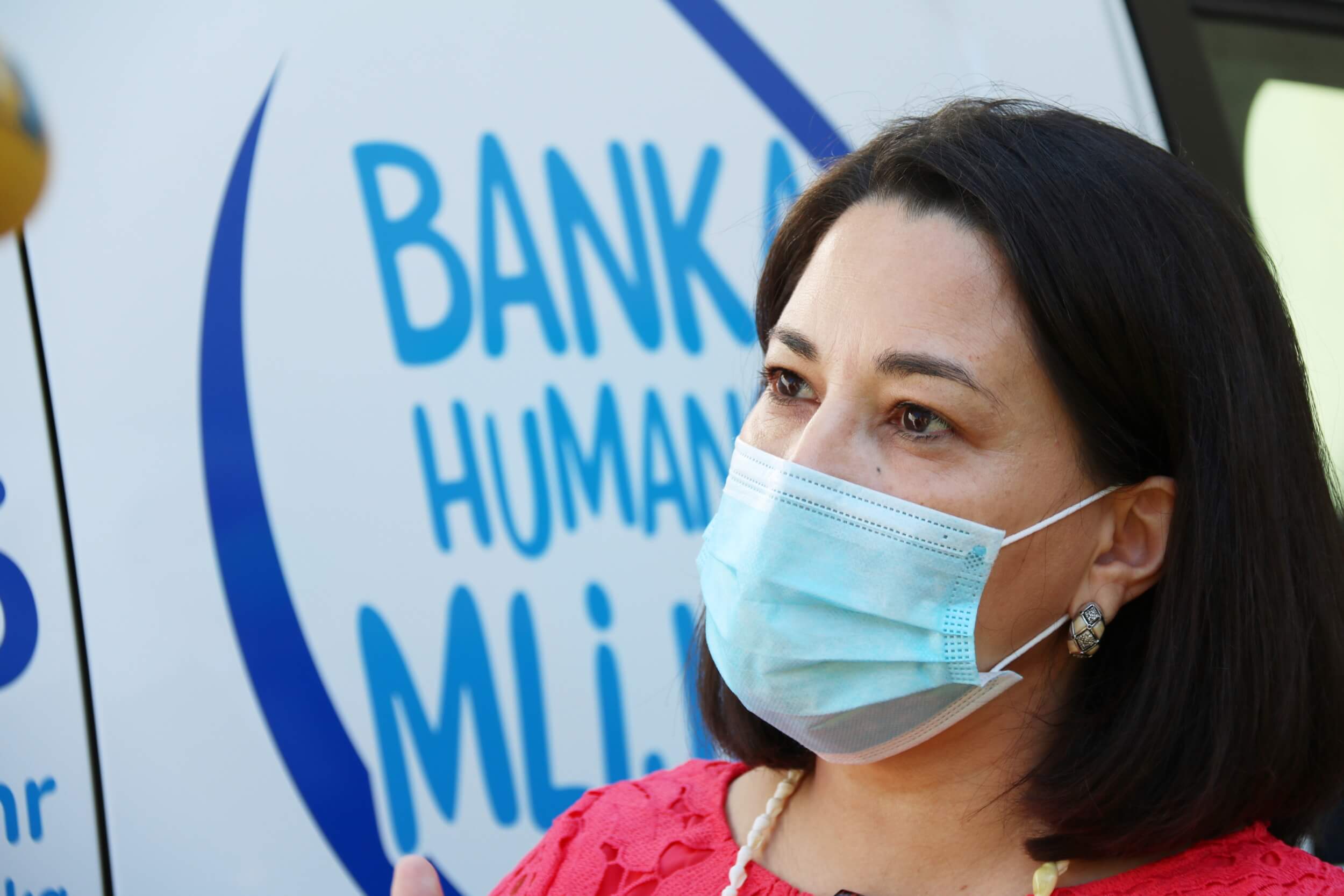
Regina M. Castillo at Human milk bank © Marin Ilej/UNICEF
Still, there are some issues Croatia needs to address and are far from ideal at the moment.
„There are still differences when it comes to access to services for children, depending on where they live and the conditions in which they grow up. Children with disabilities, as well as children from the poorest families, especially in rural areas, often do not have the opportunity to attend kindergarten and do not have the same access to specialized health services and therapies as children in urban areas. The focus of UNICEF in Croatia is on the most marginalized children: children with disabilities or developmental delays, children growing up without adequate parental care, children from minority groups, children at the risk of poverty and exclusion. UNICEF’s programs are focused on the well-being and protection of every child, with a special focus on the most vulnerable children“, pointed out Castillo.
Campaigns and programmes such as “Every child needs a family”, “The first three are the most important”, and “Stop violence among children” are perhaps the most known public action by UNICEF in Croatia, but returning to the good practices of breastfeeding, Castillo emphasizes the establishment of the Human Milk Bank in her current mandate.
„Thanks to the Human Milk Bank, prematurely born and seriously ill newborns (who do not have access to their own mother's milk) can receive milk donated by other mothers. We continually work on reducing the risk of disasters, support the development of quality foster care and provide support to parents in the upbringing and care of children through workshops and we work a lot with young people“, said Castillo.
In general, UNICEF has different types of offices in countries, and regarding the Croatian office, it’s a Country Office. In other words, most of the resources (human and financial) are invested in programs in Croatia. Castillo says that the five-year mandates have priorities that are determined in cooperation with partners. And while 80 percent of the funds raised are invested in programs for girls and boys in Croatia, there are funds and support programs for children outside of the country.
“For example, in 2018, UNICEF supported child health care in parts of Ukraine affected by the conflict and helped the building of five inclusive children's playgrounds in two refugee camps in Jordan in cooperation with the Ministry of Foreign and European Affairs in 2019. Through the ‘Schools for Africa’ program , which includes many kindergartens and schools throughout Croatia, UNICEF supports the education of girls and boys in Madagascar", Castillo listed several examples.

Regina M. Castillo, UNICEF office for Croatia representative with children on Media Literacy days press conference with Radovan Fuchs Minister of Science and Education, Krešimir Partl, State Secretary at Ministry of culture and media and Robert Tomljenović, Deputy Director of the Council for Electronic Media © Marin Ilej/UNICEF
Overall, the UNICEF Office for Croatia works closely with the Croatian Government, and most notably, with the Ministries of Social Welfare, Education, Health, and the Ministry of Foreign and European Affairs. Other partners also include experts (Croatian experts, but also building on expertise and good practice from all over the world), professional associations, academia, services providers, and NGOs.
“UNICEF’s goal is to connect all stakeholders and to advocate and support systemic change for the well-being of all children. System change is a gradual process, and it can be challenging, but when it comes to children’s rights, every step forward is well worth the effort”, explained Castillo.
Croatian citizens showing support for UNICEF
On one hand, Croatia is a good country with low mortality rates of kids and a role model for breastfeeding promotions. On the other hand, however, peer to peer violence (on whose suppression the aforementioned “Stop violence among children“ campaign works heavily on), and unequal approach to education between rural and urban areas show Croatia has both its ups and downs. Unfortunately. The downside sometimes overshadows all the positive things.
One such instance was the tragic death of a two-year-old girl from Nova Gradiška on Easter Sunday. The death of a severely injured girl, who was brought to Zagreb's children's hospital after suffering abuse and heavy beating from her biological parents (and from whom the girl was taken and given to a foster family but was then returned back to biological parents), sparked controversy and citizens outrage, culminating in changes in social welfare law, as well as sacks and investigations in the welfare center in Nova Gradiška.
„We are deeply saddened by the tragic death of two-and-a-half-year-old Nikoll on Easter Sunday. There are no words to express the pain of such a terrible event. Unfortunately, there are no simple and quick solutions to prevent violence against children. For years, UNICEF in Croatia has been continuously and persistently working in the field of child protection, educating experts from the social welfare system, but also other experts who work with children and families, such as experts from the health care, education, and justice systems. UNICEF implements various support programs for parents, and it is fully committed to the development of foster care and the improvement of the legislative framework. However, UNICEF is also aware that society as a whole, has a long way to go to achieve the goal that every girl and every boy is guaranteed the best possible care and protection. UNICEF will continue to work actively, persistently, and dedicatedly with all partners to achieve it”, commented Castillo.
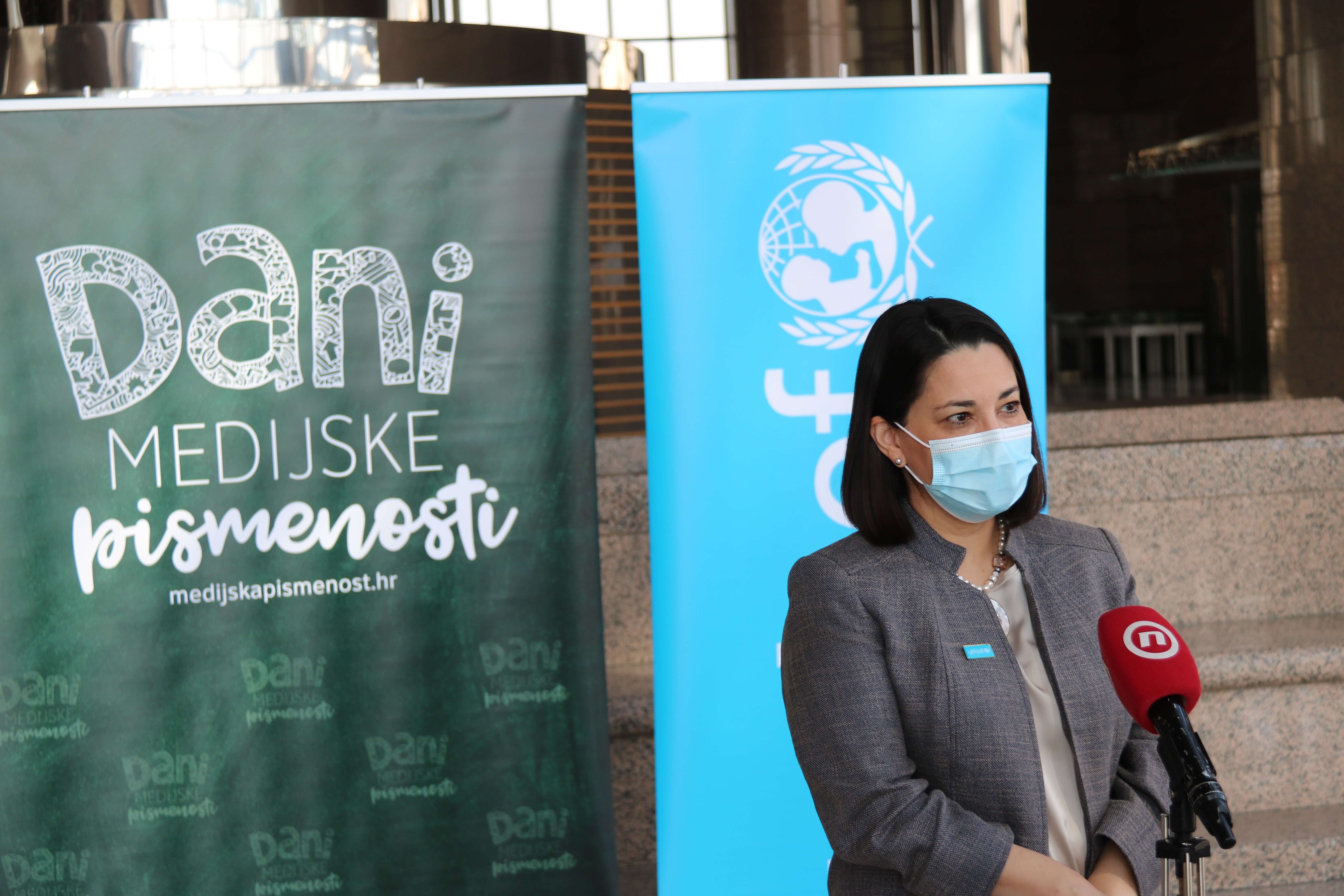
Regina M. Castillo talking on Media Literacy days press conference © Marin Ilej/UNICEF
However, Croatians recognize the importance of the UNICEF mission. Before Covid, UNICEF annually collaborated with the Museum of Illusions on the Museum of Reality exhibition which displayed the problems children faced worldwide, but which also showed what changes and solutions UNICEF brought to those areas.
“Experience tells us that citizens are ready to support the youngest, in Croatia and beyond. Implementation of our programs would not be possible without the support from citizens and companies that placed the focus of their CSR activities precisely on children. We especially value the support from our Childhood Guardians, donors who support our work with regular monthly donations and allow us to regularly conduct our programs for boys and girls, as well as react quickly with much-needed assistance in crisis situations like the earthquakes in Croatia and the COVID-19 pandemic that affected all families. UNICEF is always in the field with the most vulnerable children and their families”, notes Castillo.
In the end is important to note, that while children are recognised as a particularly vulnerable group, all human rights apply equally to children.
“All the rights enshrined in the Convention apply to every child, regardless of a child’s country of origin, gender, religion, and nationality. Every child, by birth, has all his/her rights, the right to grow up in a safe environment, to have a family, to have access to health care and education, to be able to play and develop his/her interests and reach his/her full potential”, concludes Castillo.
The five-year mandate is an agreement that sets priorities in advance, so Castillo warned that there is no opportunity for making donations outside of that framework. UNICEF office occasionally does get messages from citizens who need advice or help on issues outside of that frame, but nevertheless, UNICEF can offer them help by referring them to institutions and addresses that can offer citizens the necessary support, financial support, or information.
With expertise mentioned several times throughout this story as the insurance of delivering the best solutions to issues children face, UNICEF is always on the lookout for new people. If you want to make a change in the world while earning a fair wage yourself, check out what expertise UNICEF is looking for right now.
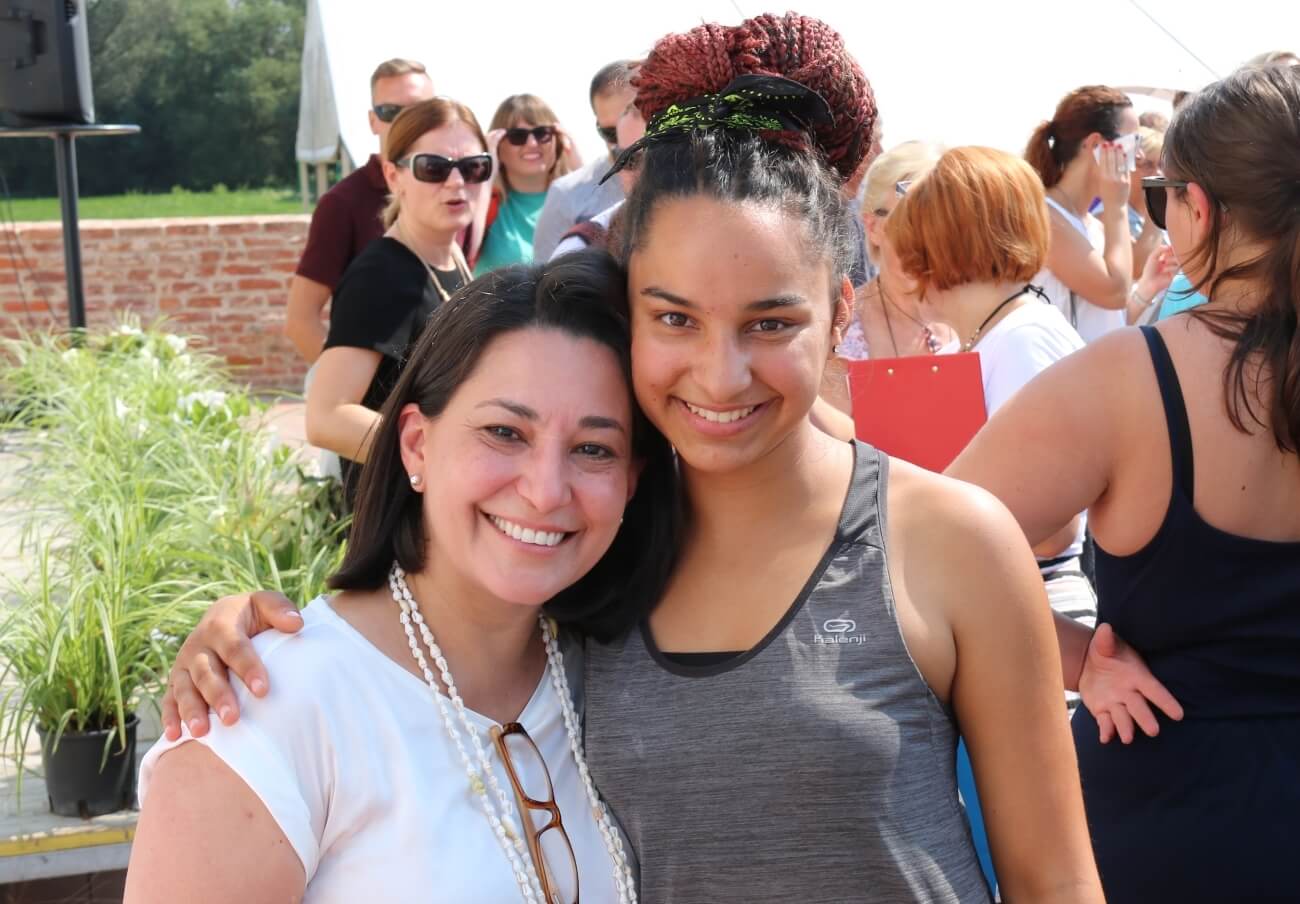
Regina M. Castillo on a foster family gathering © Marin Ilej/UNICEF
UNICEF Croatian Office is situated on Radnička cesta 41/7. To inform the public of their work, they built a considerable presence on Facebook, Twitter, Instagram, Youtube, and Linkedin. You can also find all UNICEF-related info for Croatia on their official website, and contact them via mail: This email address is being protected from spambots. You need JavaScript enabled to view it. or on phone numbers: +385 1 2442 660 and +385 1 2442 661. You can use the website to donate to a cause in Croatia too. Additionally, there are numbers: +385 1 4095 855, +385 99 2692 196, and +385 91 621 1039 for more details on donating to Croatia as well as e-mail address This email address is being protected from spambots. You need JavaScript enabled to view it.. You can also leave a donation to UNICEF in your will, and a phone number +385 1 3031 640 specializes for the issue in Croatia. If you find yourself in Croatia and you want to volunteer for UNICEF, more info can be found by sending a mail to This email address is being protected from spambots. You need JavaScript enabled to view it. and on phone number +385 1 3031 646.
And of course, you can donate for a good cause to UNICEF for any action the fund is internationally involved in.
To read more from the series "Friends of Croatia", follow TCN's dedicated page.
For more about UNICEF in Croatia, follow TCN's dedicated page.
Faculty of Science (PMF) Donation: Five New Laptops For Faculty of Metallurgy in Sisak
May 25, 2021 - Following the issues caused by the earthquake in Petrinja, a Faculty of Science (PMF) donation o the Faculty of Metallurgy in Sisak ensured five laptops for students that need them the most.
The devastating 6.3 earthquake that hit Banovina / Banija on December 29 saw Croatia still have a troubling situation in Petrinja, Baranja, Glina, and other places, which also attracted huge public interest regarding voters mood in those areas on local elections.
The need for help and donations is still for rebuilding and restoring functional infrastructure is still needed, and on top of it all, it's one of the poorest regions in the whole country. Sadly, that also goes for the students of the Faculty of Metallurgy, the University of Zagreb, which is based in Sisak.
As reported by the official website of the Faculty of Science (PMF) at the University of Zagreb, the Metallurgy Faculty dean, dr. Zdenka Zovko Brodarac wrote to PMF asking for a donation for five functional computers for their students of weaker economic status, coming from quake-hit areas. Computers are even more needed due to the coronavirus pandemic; online classes are ever-present in the education of the new generations of Croatian experts and intellectuals.
„PMF knows that the big demands of online learning are put before students, and it's very challenging to deal with that form of learning, particularly for families with lower incomes. To ensure quality participation in online learning, PMF decided to donate five laptops“, informed PMF.
Student representatives and the deans of two faculties were present while receiving computers. Zovko Brodarac thanked them for the computers promising they will find their way to those who need them the most, while PMF dean dr. Mirko Planinić pointed out that he supports all activities regarding education and youth, and overall raising the living standards of people in the area.
PMF is the home to the geophysical department, whose domain of scientific interest also includes earthquakes. Furthermore, within the department operates a Croatian Seismological Survey that collects and analyzes these powerful forces of nature in Croatia – both in their most destructive editions and in unnoticeable ones too. The shocking aftermath saw Croatian authorities taking the threat more seriously, and as TCN reported earlier in 2021, acquiring new equipment for measuring seismic activity that was placed on Petrinja cemetery.
The Metallurgy Faculty in Sisak saw its constitution as an independent unit within the Zagreb University on February first, 1979, while its scientific-educational council was established a year earlier, specifically on November 3rd, 1978. This was an answer to the educational need to meet the industrial development of Sisak, which in Croatia remains a synonym for the heavy industry even today.
The faculty offers education for metallurgy (specializations for metallurgical engineering and industrial ecology on bachelor level), as well as workplace security and health studies (major level), and the course on metallurgy engineering (machinery. shipbuilding, and aircraft).
Did you know that an hour and five minutes drive from Sisak is Lonjsko Polje Nature Park? Learn more on our TC page.
For more about education in Croatia, follow TCN's dedicated page.
Coca-Cola Donates HRK 150,000 to Sisters of Charity Hospital Tissue Bank
ZAGREB, 10 May 2021 - Coca-Cola HBC Croatia has donated HRK 150,000 to the Blood Transfusion and Regenerative Medicine Unit at Zagreb's Sisters of Charity Hospital, to be used to purchase a tissue freezer, which will facilitate the work of experts at the Tissue and Cell Bank clinic, the company said on Monday.
The freezer can be cooled down to -86 degrees Celsius and it will be used to store tissue to be used throughout Croatia.
The donation is a contribution to a project intended to modernize and equip the clinic to expand its activities to four new types of therapy, including therapy with stem cells, the company said, noting that the donation will improve the safety, quality control, and efficacy of the therapy as well as achieve scientific excellence aimed at employing young researchers.
Hospital director Mario Zovak thanked Coca Cola for the donation, saying that the full potential of the hospital's contribution and introduction of new types of tissue and cell therapy was considerably limited due to a lack of equipment as well as inadequate space as the hospital premises were damaged in last year's earthquakes.
(€1 = HRK 7.526977)
For more, follow our lifestyle section.
Croatian Enterprises Donate Record Amount of Food in Crisis Year
May the 6th, 2021 - Croatian enterprises donated a record amount of food during the most difficult global situations since the Second World War - the ongoing coronavirus pandemic - which has left deep scars on the economies around the world.
As Poslovni Dnevnik/Marta Duic writes, as part of the preparations for the awarding of the "Best Donor" (Najdonator) award to Croatian enterprises that reported the most donated food products, data on the total number of registered donations throughout pandemic-dominated 2020 were published.
According to the data released by the Tax Administration, the total purchase value of donated food without VAT in 2020 amounted to a massive 19,278,809 kuna. This is an increase of one third compared to pre-pandemic 2019, when 12,991,467 kuna of donations in the form of food were reported. The sales value of donations amounted to 29,004,125 kuna, which is significantly more than the 19,836,745 kuna donated back in 2019. A total of 85 Croatian enterprises reported their food donations to the Tax Administration.
"The earthquakes in Zagreb and Central Croatia and the coronavirus pandemic caused enormous damage to Croatia, but it gave both people and companies a chance to show how much they care about each other when things are difficult. Convoys of aid trucks pouring into the affected areas can also be seen in this donation data. Thanks again to everyone, food donation in Croatia is growing from year to year, but we haven't ever experienced such a jump so far. It should be borne in mind that the earthquake hit Central Croatia back at the very end of 2020, so we expect a big increase for the current year,'' stated Biljana Borzan, the vice president of the Eurosocialists and organiser of the Croatian Najdonator award.
It's worth mentioning that Borzan and the Food Network launched the Najdonator initiative back in 2018 in order to give the proper and deserved recognition to the largest food donors among Croatian enterprises. Previous winners of the annual award were Konzum and Dukat among large companies, and Sana delicacies among small and medium-sized companies.
The fourth time of the awarding of the Najdonator award is planned for the autumn of 2021, depending on the epidemiological circumstances. The organisers will contact all donors who have reported their respective donations to the Tax Administration, to determine which Croatian enterprises contributed the most to the large increase in donations last year.
“It seems that we need an earthquake or some natural disaster to understand that there are people in need, but it's great that companies have stepped up and donated more, primarily because of the earthquake. There's been a significant increase. It's also necessary to be aware that there are those "invisible" people in need around us, who are looking for food every day and mostly depend on donations from producers and retail chains, those whose need is not published in the media. I sincerely hope that this practice of donating, which has been significantly better than it was back during previous years, will continue. With this, we really want to encourage donors to continuously donate surplus food that they have on a daily basis,'' said Zoran Grozdanov, the coordinator of the Food Network.
For more, follow our lifestyle section.
INA to Donate HRK 1.4 Million To Healthcare Sector
ZAGREB, 5 May, 2021 - The INA oil company will donate HRK 1.4 million to healthcare institutions this year, aware of the exceptional circumstances that the system is faced with due to the coronavirus pandemic, the company said in a press release on Wednesday.
In the wake of last year's earthquakes in Sisak-Moslavina County, INA has donated HRK 500,000 to the Sisak General Hospital and an additional HRK 900,000 to other institutions.
INA plans to donate HRK 150,000 each to the Oncology Department of the Hospital for Children's Diseases in Zagreb and the Clinical Hospital Centre (KBC) in Rijeka as well as HRK 100,000 each to KBC Osijek, the tissue and cell bank at the Sisters of Mercy Hospital in Zagreb, the Hospital for Infectious Diseases in Zagreb, the Cardiology Clinic in Split and two civil society associations.
The Sisak Health Care Centre and the Special Children's Hospital in Gornja Bistra will receive HRK 50,000 each.
The donations are intended for the improvement of diagnostics, procuring new equipment and improving accommodation for patients and working conditions for medical workers.
In addition to money donations, the hospitals will receive a total of 500 litres of INA's Dezinol disinfectant which was developed by INA during the pandemic.
In the past 10 years INA has invested HRK 6.5 million in healthcare in Croatia.
(€1 = HRK 7.5)
For more about business in Croatia, follow TCN's dedicated page
US Embassy Donates GeneXpert Machine to Zagreb's Infectious Diseases Hospital
ZAGREB, 30 March, 2021 - The US Embassy in Croatia has donated a medical device to the Fran Mihaljević Hospital for Infectious Diseases in Zagreb that can detect the coronavirus in less than 45 minutes, the hospital's director Alemka Markotić said on Tuesday.
Four samples can be placed in the GeneXpert machine at the same time. However, it is not used for mass testing, but is useful in quickly dealing with certain situations, Markotić said.
US Embassy official Victoria Taylor said that this is not about just a piece of equipment, but also about the partnership between Croatia and the United States.
We are happy that our small contribution can help the Fran Mihaljević Hospital and the healthcare system in time of need, Taylor said, commending all Croatian health workers for their tireless work during the pandemic.
Markotić said that most of the patients in the hospital's COVID ward were between 50 and 65 years old and had underlying conditions. She noted that the hospital was nearly filled to capacity.
Markotić said that for now there was no substantial number of young people infected with the British variant of the coronavirus in the hospital, but noted that this variant was proved to be spreading faster among young people because of "their greater nonchalance, mobility and socialising."
She warned that the number of new cases was growing and called on the citizens to avoid "risky situations".
Markotić expressed hope that patients would not be left without medicines, after wholesale drug suppliers warned last week that they might restrict drug deliveries because of HRK 6.5 billion debt owed by the hospitals.
Drug wholesaler Medika said today it had suspended drug deliveries to the hospitals.
Markotić said that her hospital had sufficient drug supplies for now. "We hope that we will not find ourselves in a situation where we, or rather our patients, will be left without medicines."
Prime Minister Andrej Plenković said earlier that Finance Minister Zdravko Marić and Health Minister Vili Beroš would meet with drug wholesalers to discuss the debt and that they would be paid a certain amount of money in the coming days.
For more about health in Croatia, follow TCN's dedicated page.
The State Electoral Commission (DIP) Tells Donors to Respect Law, Take Note of Allowable Amounts for Electioneering
ZAGREB, 16 March, 2021 - The State Electoral Commission (DIP) has advised companies and citizens who intend to make a donation to participants running in the May local election, to respect the law and take note of the maximum allowable amount that may be donated.
All physical and legal persons intending to donate money, products or services are obliged to register all the relevant information and should be issued with a receipt by the recipient party or independent slate.
Donors must not have any debts to the state or local authorities.
If donations are made in products, then the value of these must be identified.
The maximum amount of a donation for physical entities is HRK 30,000 and for legal entities HRK 200,000. Donations can be made once or in several instalments and must be pad into a separate electioneering account.
Contracts for donations greater than HRK 5,000
Donations of HRK 5,000 or more require a contract to be concluded between the donor and recipient (party or independent slate).
DIP has published guidelines regarding the financing of electioneering which are available at its website.
For more about politics in Croatia, follow TCN's dedicated page.
New Zealand Croats Collecting Donations for Quake Victims in Croatia
ZAGREB, 31 January, 2021 - The Croatian community in New Zealand has joined in aid raising campaigns for the Croatian areas affected by the 29 December devastating earthquake.
Thus, the Croatian Cultural Society in Auckland has opened a bank account for pecuniary donations for families in Petrinja, Glina and Sisak.
The Croatian Catholic Mission in Auckland already paid 5,000 dollars to a family in the village of Sibić.
The Croatian Cultural Society president Goran Katich said that the society would collect the donations throughout this year and would also organise humanitarian concerts and other events to raise relief for the quake victims.
According to the data provided by the the New Zealand Foreign Affairs Ministry and Trade, there are more than 100,000 Croats and their descendants in that country.
"Croatian immigrants began arriving in New Zealand from the 1850s and today there are more than 100,000 New Zealanders of Croatian heritage. There are also more than 2,500 Croatian nationals living here," the ministry said on its website.


